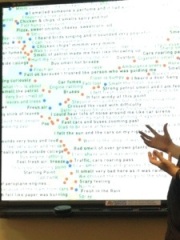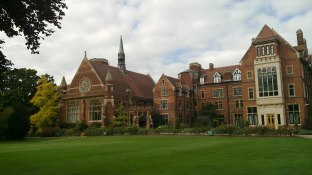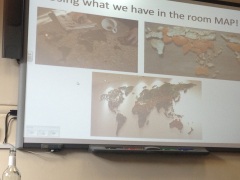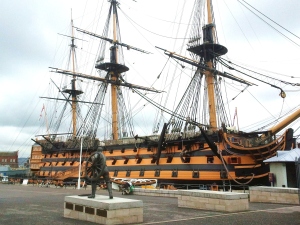
So last night saw the relaunch of TeachMeet Pompey for the new academic year, set up by David Rogers and myself. And what a way to kick off the new term! Phewf! For David’s write up check his blog.
The evening began with an incredibly civilised and fancy meet and greet on board HMS Victory, courtesy of our ever helpful host and organiser Phil Wright over at the Historic Dockyard. Ok, so there was a torrential downpour but it didn’t dampen spirits. We were welcomed on board by the Royal Navy serving refreshments (pleased to say the homemade cupcakes went down well in the end!) and then relocated to the National Museum of the Royal Navy for the meet itself.
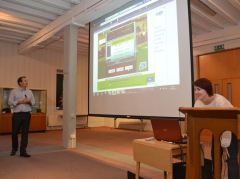
We had a packed evening with cracking presentations. What makes TeachMeet so great, in my opinion, is that it is simply teachers sharing stories in a relaxed way. No pretence, no bragging, no ‘we should all do it this way’. Just simple honesty and some great ideas of what could work if you just have a go. All of the presentations are available on my slideshare . Here is the list of what we enjoyed:
Charlotte Assomo – using video feedback
Julia Skinner – 100 word challenge and improving literacy
Rachel Jones – public outcomes enquiry
Nik Doran – beautiful graphing (making maths artistic!)
Shorny Morgan – 7 ideas in 7 minutes (and well done for your first TM presenting!)
Ian Addison – messing about with photo editing
Danielle Kohlman – Purple pages of progress (AfL)
Phil Wright – different places and using the Historic Dockyard resource
Nic Boardman – Using Socrative
Naomi Ward – turning poetry into video games
Charlotte Hamilton – A bag full of bits
Louise Boston-Mannah – the Global Learning Programme

Everyone who shared brought something new, something useful. A rapid fire 2 or 7minute insight into an innovative teacher’s mind that gave you food for thought. So thank you! Plus all the resources were my favourite price – FREE! The presentations give you some clues into the action, but for more information get in touch with each speaker personally. Email or DM me on twitter if you do not know how to contact.
We ended with a fantastic and inspiring keynote from Tim Rylands who shared a whole realm of interesting links and ideas, in a brilliant and humorous fashion. It was hard to keep up, and the twittersphere hashtag went unusually quiet at this moment as we were all gripped and avidly listening. Loving the look of Tag Galaxy – especially as a geographer – this looks a great resource to visualise the world and compare places, cultures, etc,. I already use If This Then That and recommend this as a great way of linking media / social media / resources etc such as dropbox, twitter, facebook, etc,. Clevr looks an interesting tool to make panoramas, and I agree with him in sharing the utility of Photosynth – dead easy and available on multi-platform / devices. Far too many fantastic links for me to share and do justice to, so check out his blog for his own discussion on them. So thank you Tim, it was a privilege to have you join us. Sarah also rushed around taking fantastic photos, such as a few seen here, and putting all the cogs in place so thank you as well. For Tim’s write-up and all the images, head over to his inspiring blog here . Also all the links that he mentioned in his talk are very kindly being shared via this link.
Thank you to everyone who came and participated – we had a 100 people taking part as presenters or ‘enthusiastic lurkers’ and even had others from afar joining in via twitter to get involved. Thank you also to two of the @priorygeography Digital Leaders and Curriculum Hackers, Robbie and Jon, who came along voluntarily in their own time to simply listen, and then went round the room during breaks networking like pros! They are a credit to the school and I’m proud to work with them.
It was great to see new presenters who have never spoken before, and all did a fantastic job. I shall certainly be trialling lots of the ideas shared. Particularly keen to get school involved with the 100 Words Challenge (see @theheadsoffice or 100wc.net) and can see this having a very beneficial impact on our need to improve literacy and embed this whole school. I also loved some of the photo editing tools shared by Ian Addison such as picmonkey.com, 5 card flickr, or Animoto. Some great ideas from newbie presenter Shorny Morgan such as #poundlandpedagogy – awesome idea for starters to lessons, for inspiring literacy responses to stimuli, for enquiry. Also liked the idea of ‘paint chart literacy’ – having a paint colour swatch chart and asking students to start with one adjective at the bottom and then having to think of a simile / synonym for the other colours above. Great stuff 🙂 Oh, and she also has a ton of Snakes and Ladders boards if anyone wants some! The elegant and enthusiastic Rachel Jones shared great enquiry and ‘public outcomes’ resources – to encourage student projects by making their work visible to the outside world, giving students an audience. I already loved Hackasaurus from her presentation last TM but do recommend it again – create ‘hacked’ websites like your very own BBC page or fake CIA page! Nik Doran shared how to make Maths artistic and pretty using Desmos to visualise graphs; could be a great tool to enable access to analysis – possibly something to try for the old controlled assessment enquiry in future. And Louise Boston-Mannah spoke briefly to introduce everyone to the Global Learning Programme – a project that Priory Geography will be taking part in. The idea is for schools to collaborate to share resources, teaching and learning ideas, and have cross-theme and cross-curricular links designed to improve young people’s access to ‘the global dimension’ (topics that have a global aspect, e.g. development, human rights, climate change, democracy, politics, poverty, trade, culture, etc,.). @priorygeography will be the leading Expert Centre school for this programme for the Hampshire area and if you are interested in taking part then please get in touch. You can be from any school or college, any age range, any subject. There is funding available from the GLP for schools that participate in order to free up teacher time / visits to other schools / trips. I’ll be sending out requests to participate soon!
Congratulations to the lucky four who won the vouchers from ![]() – you should get your confirmed e-voucher soon! And thank you to Rising Stars for agreeing to donate the prizes and sponsor refreshments. It really helped.
– you should get your confirmed e-voucher soon! And thank you to Rising Stars for agreeing to donate the prizes and sponsor refreshments. It really helped.
I thought all the presenters did a fantastic job, and there is too much to write for here so apologise if I haven’t mentioned you personally – it’s not judgement! Just have a look at the resources on slideshare and any questions get in touch with them or come through me.
I’ll finish with a beautiful quote shared by Julia and just say thank you again, and roll on next time! Bigger and better!
“The unread story is not a story; it is little black marks on wood pulp. The reader, reading it, makes it live: a live thing, a story.” (Ursula K. LeGuin)





